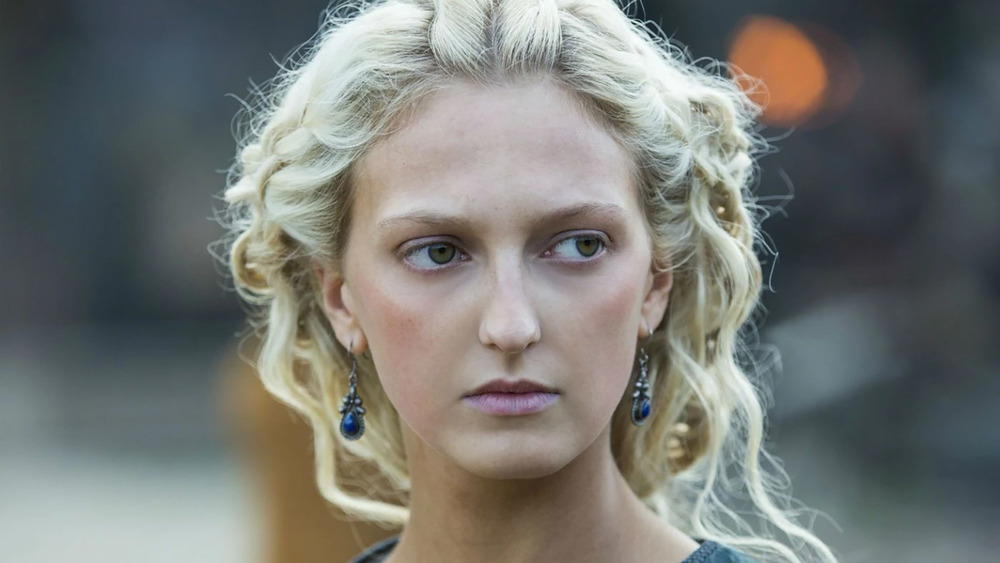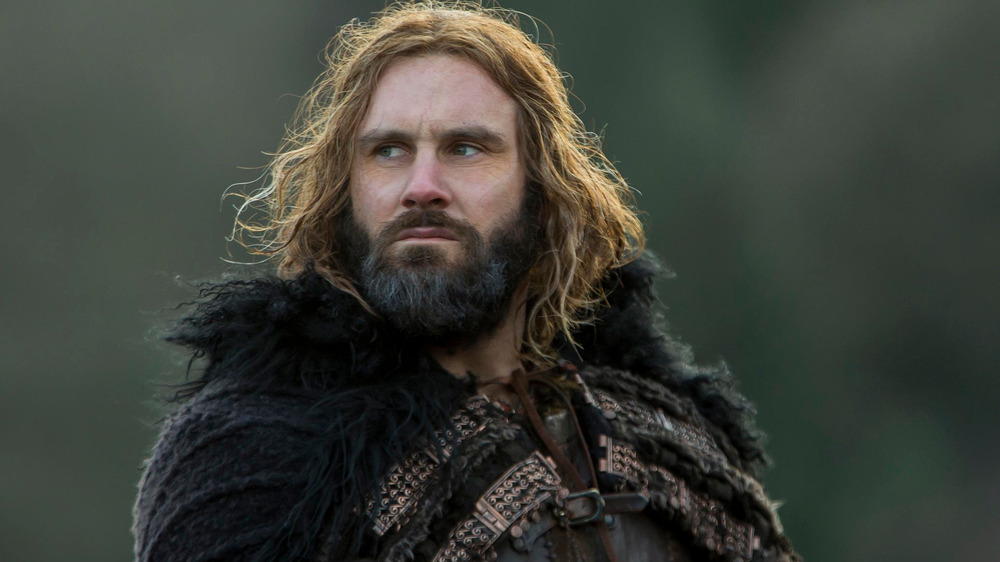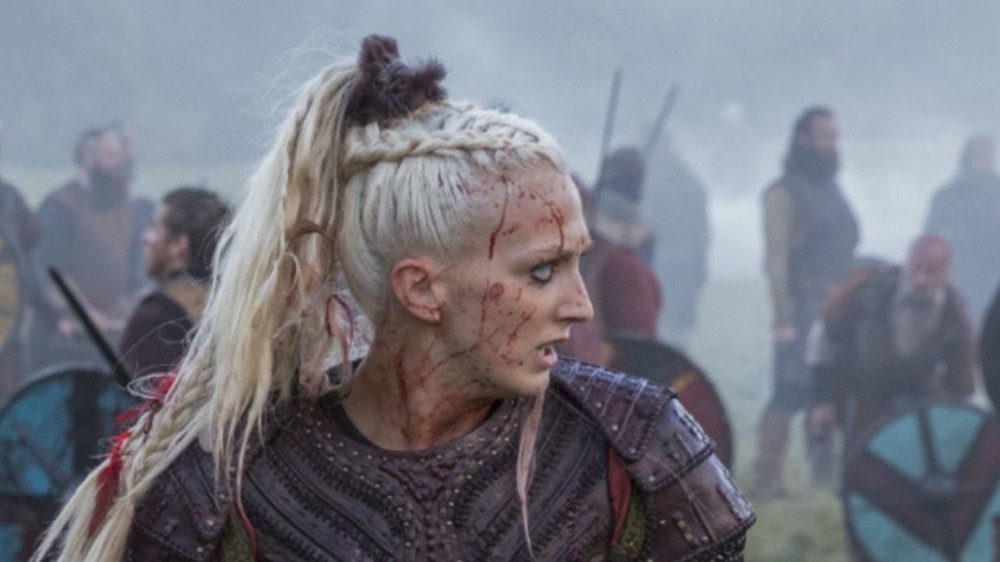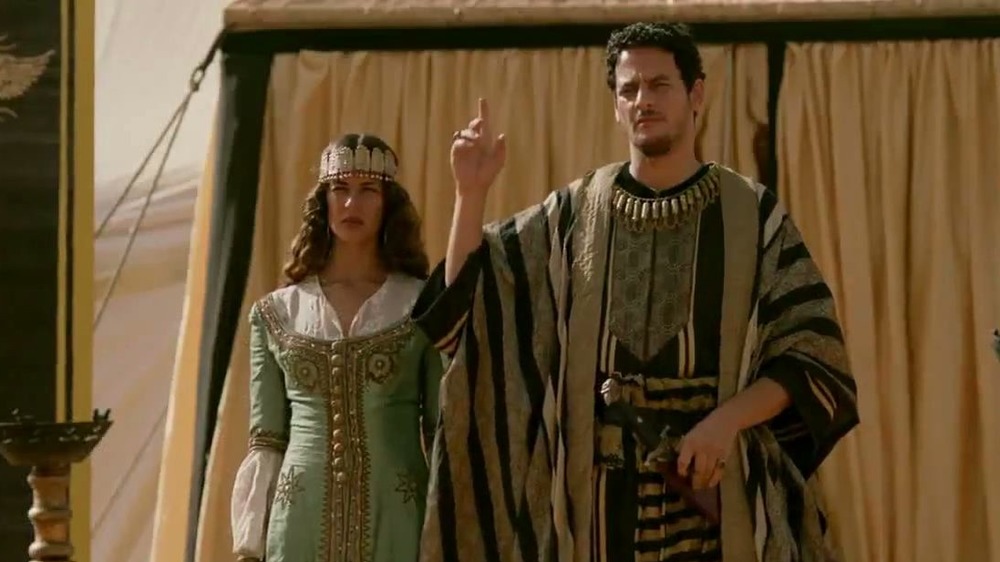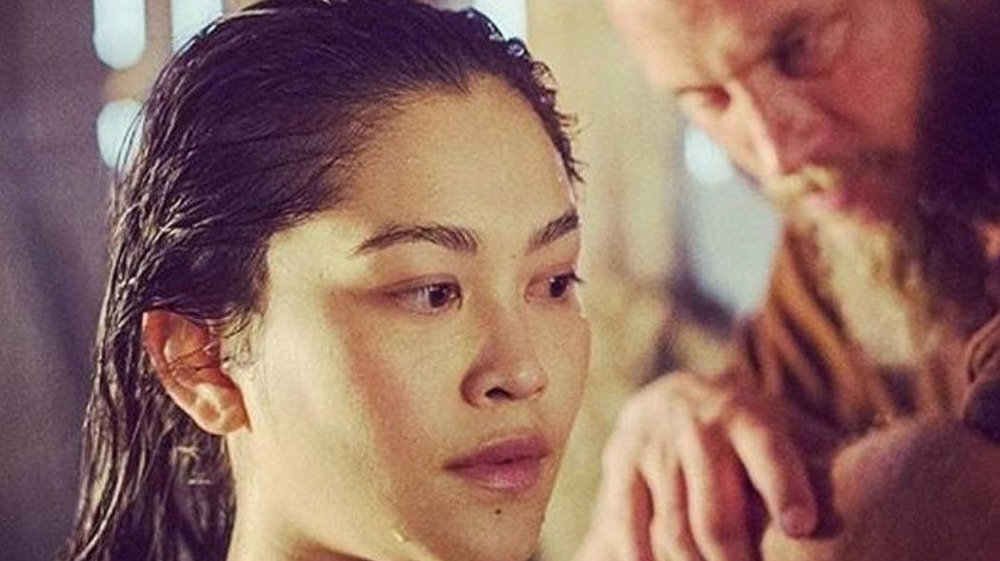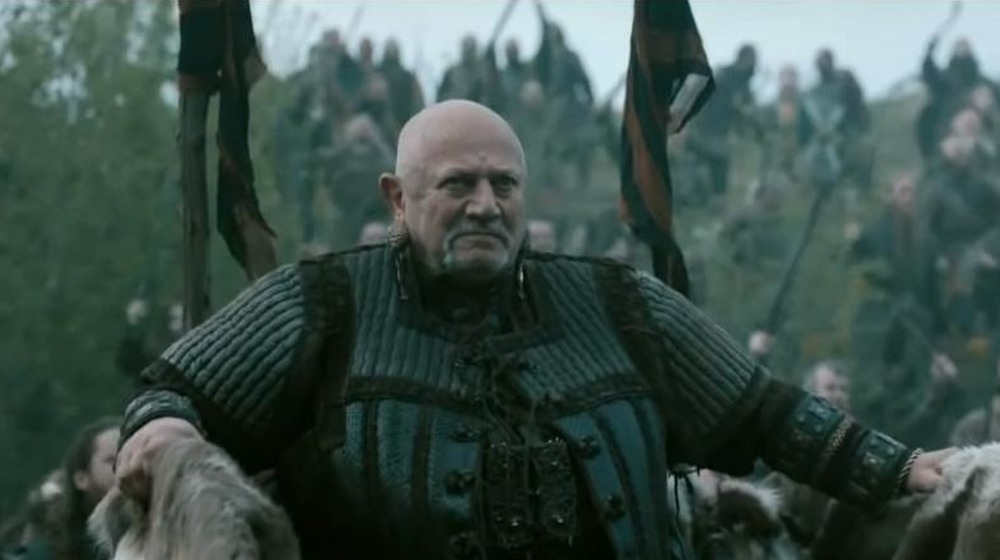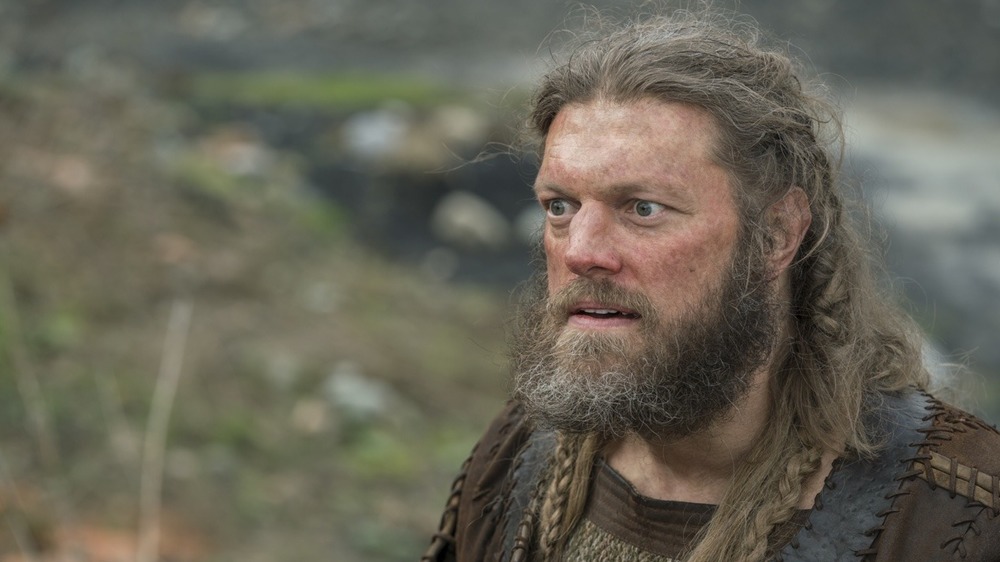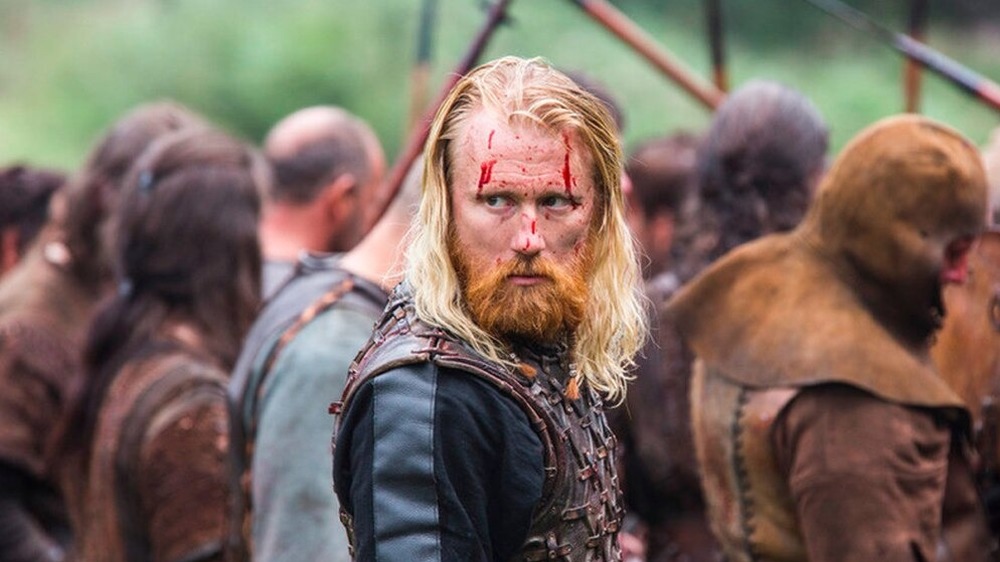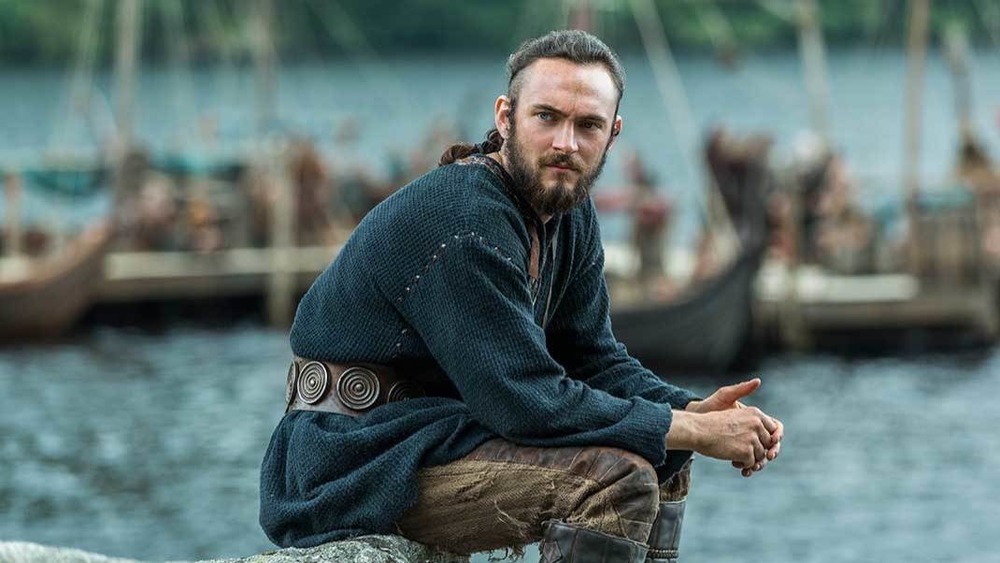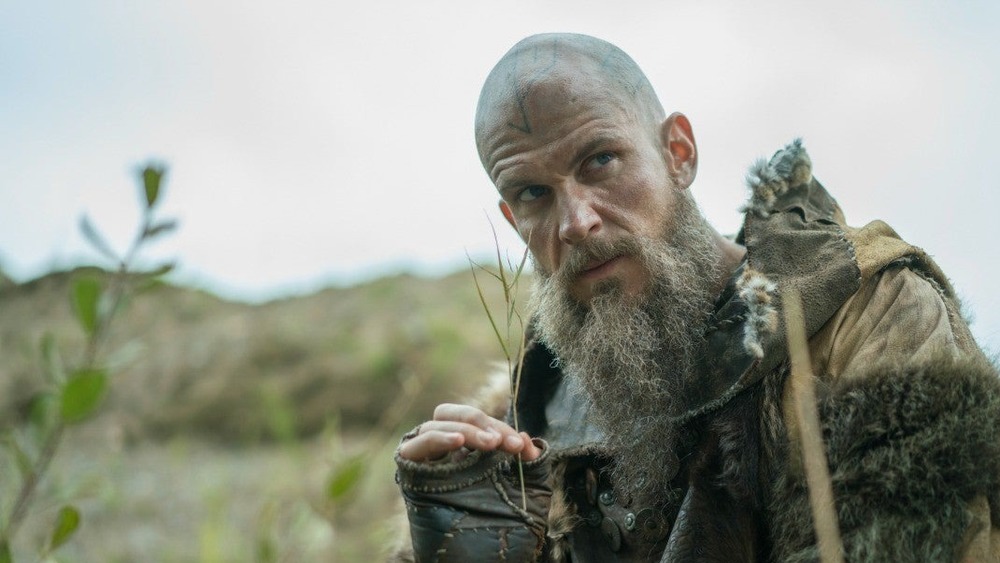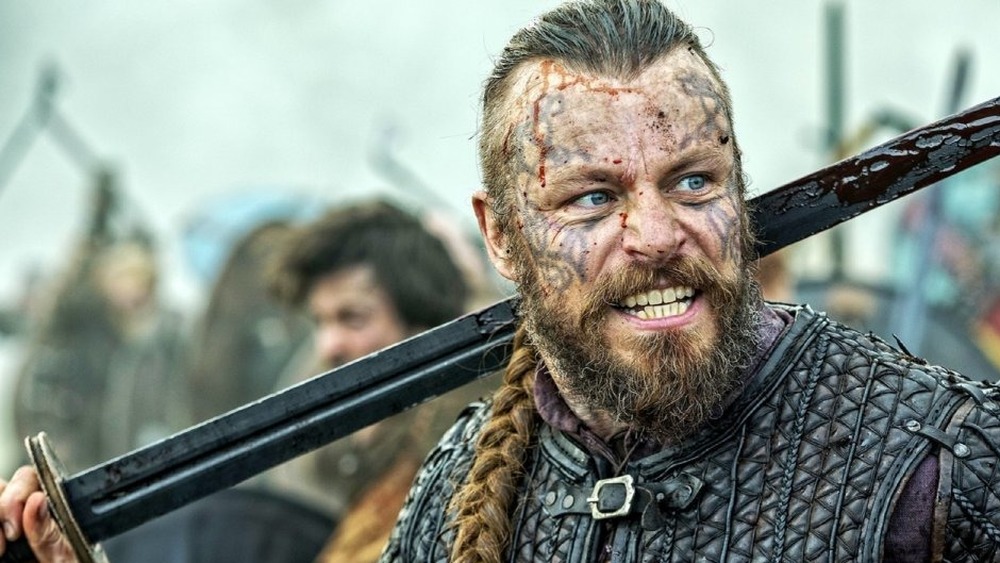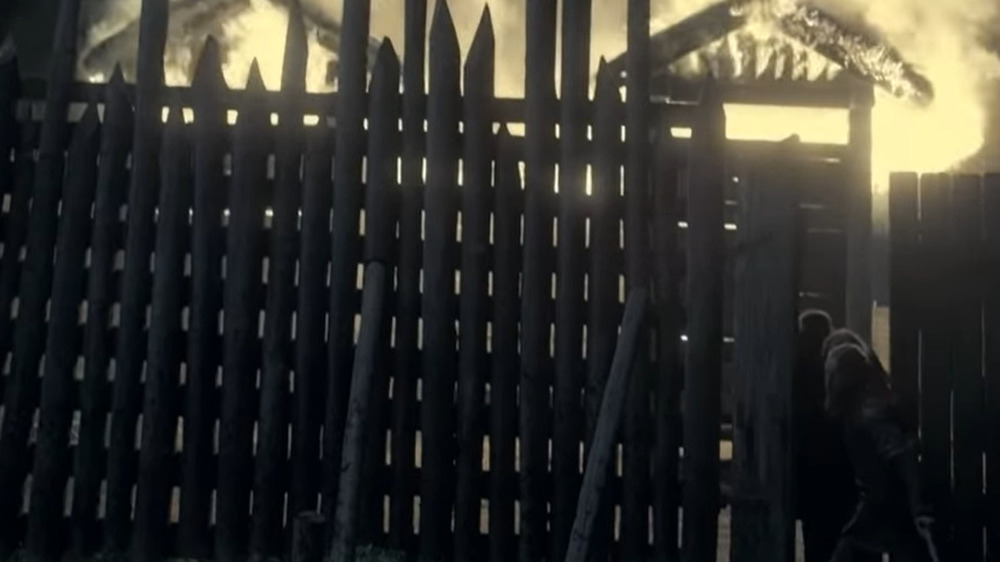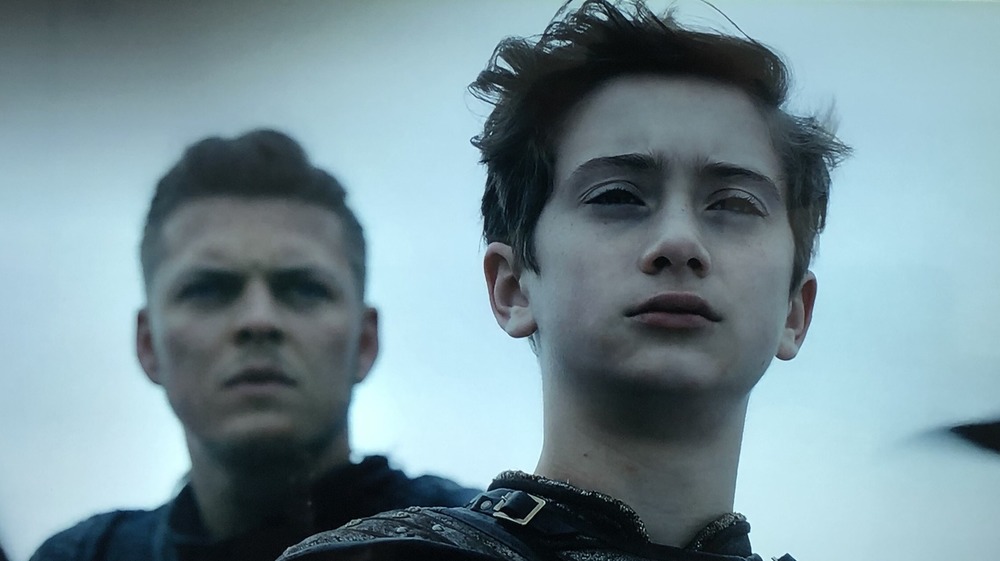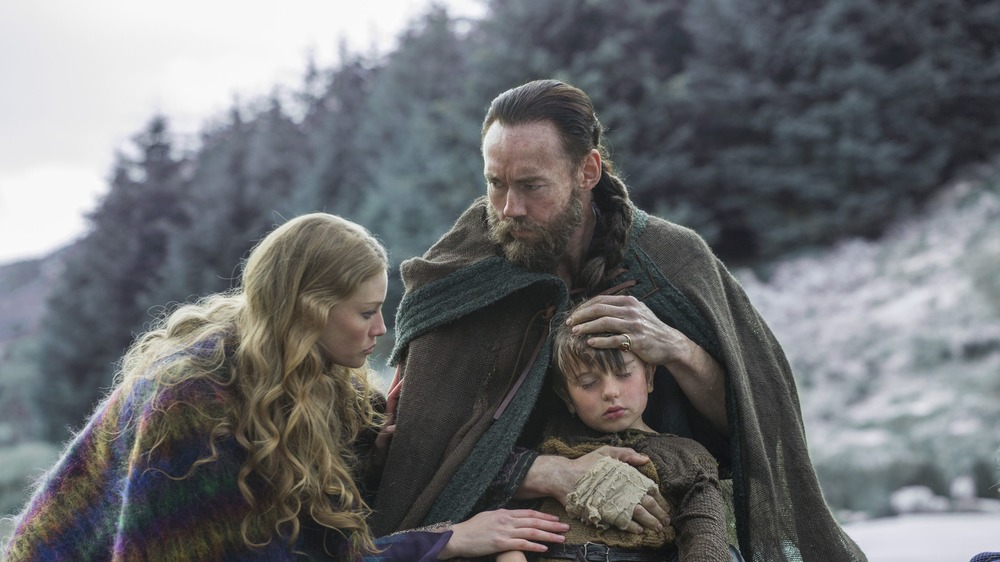Characters In Vikings That Mean More Than You Realized
Vikings is an epic saga that blends Norse legend with some very real history of conquest, exploration, family, and betrayal. The story is one that winds and weaves through generations, with visceral battles and vivid visuals ripped from a time that no longer exists. While the story is compelling, the soul of the show lies in its characters.
All of them are legendary, and have had some impact on real history. Vikings is historical fiction, granted, so nothing happens in the series exactly as it happened in real life. In some cases, timelines have been tweaked, and in other cases, changed completely. There is no historical inkling that Rollo was the brother of Ragnar, for example — in fact, Ragnar himself is a Norse legend, though it is thought he was based on a real person. King Olaf was a descendant of Harald Finehair (also called Fairhair), yet in Vikings, they are contemporaries, and fractious ones at that. The real Floki led settlers to Iceland, but was not the land's discoverer. Moreover, he was not the first Viking to land in North America: He died in Iceland.
Yet these characters who carry out the show's blend of history and story have much to teach us about our own humanity. Many of them hint at the real people they were named after, and by extension, at historical battles and lineages that shape our modern world. We're here to uncover those hidden meanings, one character at a time.
Rollo
In the beginning of the series, Rollo seems to be little more than the reverse image of Ragnar. He is reserved while Ragnar is passionate, cynical while Ragnar is hopeful, and dark-haired while Ragnar is blond. And yet he goes on to play a key role, not only in Vikings but also in history. His betrayal of his brother and people — not once, but twice — is a reminder throughout the series that nobody can be trusted when conquest and death is involved. And his help of Ivar cements the Boneless' victory against Bjorn, possibly Rollo's son, along with others he claims to hold dear.
Historically, Rollo of Normandy cemented the fearsome reputation of the Normans. His great-great-great-grandson, William the Conqueror, would take that Norman army with him to become the first Norman king of England. William's great-grandson, Henry II, was the first Plantagenet king of England. Uniquely, those with predominantly British ancestry are enormously likely to be related to King Edward III, the seventh Plantagenet king and a later descendent.
Torvi
We are introduced to Torvi as the meek child-wife of Jarl Borg, enemy of Ragnar. At that point, she seems to be of little note. When she returns as wife of Erlendur, orphaned son of King Horik, she is still dismissed as manipulative arm candy. Then Bjorn Ironside falls in love with her, and she leaves the vengeful Erlendur for Bjorn. But when she kills Erlendur to protect Bjorn and her son — with Erlendur's crossbow, no less — we realize she's more than just a trophy.
Torvi goes on to become one of the fiercest shield maidens in Kattegat, as well as part of Queen Lagertha's inner circle and one of her closest advisors. She bears Bjorn's children, and helps his mother rule as Bjorn continues his travels and their love crumbles. She finally ends up with Ubbe, births his son young Ragnar, and together, they discover the new world as part of the show's depiction of Leif Erikson's actual arrival in North America, hundreds of years before Columbus. Her story becomes a part of Ragnar's as much as that of any of his sons.
Ziyadat Allah
Bjorn's second trip to the Mediterranean is a strange side story, which culminates in him meeting Emir Ziyadat Allah. In Vikings, Bjorn rescues Halfdan from Ziyadat, and it is this rescue, plus all the great things Halfdan has experienced on these travels, that causes him to align with Bjorn against his brother, Harald Finehair. When Finehair kills Halfdan in battle, it becomes clear that he only ever wanted power for the sake of power, nothing more. This haunts Finehair to his own death. Yet Bjorn's and Halfdan's encounter with the desert nomads, and the revelation that these desert-dwellers are familiar with Norsemen, provides a great juxtaposition of backdrop for Vikings and also shows Ragnar and his sons are following a tradition of Viking exploration.
Historically, Ziyadat Allah I was real, and part of the impressive Aghlabid dynasty. Ziyadat himself sent forth the armies who conquered Sicily, establishing Arab control that would last for two centuries.
Yidu
Yidu, who is, according to herself, a princess of the Tang dynasty, has a very short, yet pivotal role in Vikings. She finds Ragnar as a man broken by disappointment. Her appearance and bearing, which is very different from the Scandinavians, attracts him, fulfilling his sense of adventure. Once they are together, her meditative calmness and philosophical worldview, grounded in Eastern thinking, helps to assuage Ragnar's regret. She gives him what is likely opium, which initially lets him escape his grief, but eventually hooks him into a brutal addiction. Soon, he can't even fight without the drug.
He commits his second truly dishonorable killing by murdering Yidu. Part of why he does this is because she's hiding the drug from him, but he also kills her because she threatens to tell everybody about his greatest secret: The extermination of the colony at Wessex. No doubt her death adds to his regret.
Yidu is also a device the show uses to convey how small the world is getting. A princess from China has ended up in Norway in the first millennium — that's no miracle, but a sign of changing times. This clash of cultures, central to understanding the show's portrayal of the Vikings' impact on the world, is embodied in Yidu's character.
King Olaf
When we first meet King Olaf the Stout, he is a portly man sitting in a sauna, greeting his visitors from behind the steam. He presides over a dreamlike northern town that is covered in snow. Hvitserk calls him a Buddha, and there is indeed a zen calmness about him at first. Other than his eccentricities, Olaf seems to be just another king with a large army, a strange sense of humor, and a raving obsession with the idea that the Vikings are at the end of the world. After fighting alongside Bjorn and Harald Finehair against Ivar, he proposes the unification of Norway under one king as a way to end the cycle of death that plagues the series.
In Vikings, that election is rigged by King Harald — much to Olaf's chagrin, since he wanted the much more noble Bjorn. This leads to a falling out with Harald, and eventually to Olaf's death. In reality, Olaf the Stout was a descendant of Harald Fairhair. Olaf eventually became king of Norway, uniting and ruling it as a Christian nation. After his death, he was canonized as Saint Olaf, and remains a huge symbol of Norwegian history, culture, and pride. Vikings shows his conversion to Christianity as a moment-of-death revelation, but in reality, it was a driving force in his life.
Kjetill Flatnose
Kjetill first appears as an elder among the colonists who follow Floki to Iceland. He brings his family and claims they are why he wants to make it work. Lagertha refers to him as a great warrior of Kattegat. Yet a rivalry between him and another patriarch on Iceland, Eyvind, soon emerges. In the end, he executes all of Eyvind's family in revenge. This leads his daughter to kill herself, and a despondent Floki to leave the colony behind.
Kjetill returns to Norway to get more colonists for Iceland, and cuts backroom deals to get King Harald elected king of Norway over Bjorn. As a man of Kattegat, double-crossing Bjorn is a foul move, but one he makes because he wants King Harald to name him king of Iceland. He redeems himself somewhat by saving Bjorn's life when King Harald's men try to kill him. This proves instrumental in preventing Ivar and the Rus from overtaking Kattegat.
He joins Ubbe on an expedition to Iceland, and then on to discover Greenland. There, he proves himself a man interested only in ruling, and a Viking of the old ways — exactly the kind nobody would want in founding a better world. A skirmish ensues, and the rest of the settlers leave him ranting atop a dead whale.
Jarl Borg
Jarl Borg is Ragnar's first real adversary. Earl Haraldson became an enemy of Ragnar because he wanted to keep control over Kattegat, but Jarl Borg just wants to conquer Ragnar's land. Ragnar has to take Kattegat back, with the help of adolescent Bjorn and ex-wife Lagertha, and in so doing, they take Borg's lands and army. From this point on, Ragnar and his family must constantly protect and build their empire — whether they want to or not. Ragnar is instantly changed from being an explorer and warrior — what he wanted to be, in short — to being a ruler, which he did not want.
Jarl Borg also brings his young bride Torvi to Kattegat, pregnant with his child. When he is killed, Horik, fearing Ragnar's growing power, attacks him and is killed as well. Horik's son marries Torvi as an alignment of Ragnar's enemies. Torvi eventually goes against Erlendur and continues on to great things — possibly much greater than what she might have experienced, had Borg not introduced her to the court.
Moreover, the death of Jarl Borg introduces the blood eagle, doubtlessly one of the most memorable forms of execution in television history.
Athelstan
Athelstan starts as a monk Ragnar enslaves instead of killing in the Vikings' first English raid. He seems, at first, like a device for the discussion of cultural and religious differences. Yet he goes on to inspire a level of humility and understanding in his friends, King Ragnar and King Ecbert, creating a common ground that brings them together. Athelstan becomes the biggest bone of contention between Ragnar's family and Floki, who hates the Christian's growing influence. After Floki kills Athelstan, he is punished severely, loses his daughter, and is almost put to death himself.
Athelstan sires a child by Judith, the soon-to-be Queen of Wessex, named Alfred. Since Ecbert knows and respects Athelstan's mind, he goes about instructing his "grandson" Alfred, taking a greater interest in the boy than in his brother, the rightful heir. He goes on to become King Alfred the Great, in part due to the fact that he was trained to be wise and learned like his birth father, Athelstan, instead of a warrior like his adoptive father, Aethelwulf.
The historical Alfred the Great was known for giving the common people a better life and building a stronger society, with a major emphasis on the importance of education. From Alfred the Great's line came Matilda of Flanders, wife of William the Conqueror, and the mother of unified England.
Floki
Floki is a clown, a zealot, and a madman. When we first meet the eccentric craftsman, Floki is also a tool of Ragnar's. He exists only to build boats, fight viciously, and scowl at enemies. But he proves to be as central to Vikings as Ragnar and Lagertha, and like Ragnar and his sons, he pushes beyond the known limits of their world.
At first, Floki could be mistaken for Ragnar's mindless follower. But their differences soon emerge, especially as Ragnar questions the gods. Loki's disagreements with Ragnar seem so extreme, even in the early days, that King Horik thinks Floki will betray Ragnar — only to find out Floki's loyalty to his friend is undying. Still, the Ragnar-Floki bickering continues throughout the series, tainting his relationship with the friend he loves above all.
After much pain and sadness, Floki finally goes off on his own and finds Iceland, returning to Kattegat only to find settlers for a colony. This is based loosely on the real-life Floki, who led one of the first deliberate voyages to Iceland to try and settle it — though he did not discover Iceland, as he does in Vikings.
King Harald Finehair
When Harald Finehair arrives in the hall of Kattegat looking to join Ragnar's next raid and claiming he wants to become the king of Norway to impress a woman, he seems to be just another foreign leader showing up for an adventure. He and his brother Halfdan make a dynamic duo, but they initially seem like minor characters at best — possibly another Horik or Borg to be quickly vanquished, the viewer might assume, head tattoos notwithstanding. Yet from the moment he courts Floki as they head to raid Paris with Ragnar, we see he will be a thorn in the side of everyone.
It's tough to find a character he hasn't double-crossed. He fights alongside Ivar to win Kattegat, then against Ivar to take it back. He tries to kill Bjorn, saves him, then tries to kill him again. He's double-crossed Lagertha, Gunnhild, his beloved brother, and, well, the list goes on. King Harald is one of those power-hungry men Ragnar warns against. When he finally becomes king of Norway, he becomes almost as despotic as Ivar had been. It is appropriate that he and Ivar end the series dying in a battle for glory against the king with whom Ubbe and Bjorn made a deal.
The real Harald Fairhair did unite Norway as its first king. What we know of his life is vague, however, as most accounts of it were written centuries after his death.
The many "Orliks" of the series
Who is Olrik, you ask? Olrik is Bjorn's friend, with whom he and Ragnar set fire to Jarl Borg's stores as the first step in throwing Borg out of Kattegat. Olrik acts as a diversion and is injured, then never seen again. He is, however, a key player in a battle that determines the fate of Ragnar's family for the rest of the series.
There are many "Olriks" in Vikings: Characters who show up briefly and play a pivotal role in a scene that is important to everything. There is the random man Freydis has sex with so that she can tell Ivar that he impregnated her, proving he's a god. There is the unnamed monk who Athelstan kills, thus beginning Athelstan's return to his belief in Chrstianity, which leads to his ultimate undoing. Prince Wigstan of Mercia appears once, to give King Ecbert the ammunition he needs to replace Kwenthrith as sovereign of Mercia. Then there are the three different people who give themselves up to be sacrificed, showing how Viking courage and religious faith are truly foreign to our modern beliefs. All of these "Orliks" are minor, but when you thoughtfully consider their impact on the show, you realize they're enormously meaningful.
Prince Igor
Ivar becomes the most ruthless dictator on Vikings. By the time he arrives in Rus, however, he is humbled by defeat. While there, he meets Prince Igor, and sees the young boy as key in navigating a power struggle between Kiev and Novgorod. Ivar emerges from this as a more powerful man, able to overthrow Kattegat. This conflict is rooted in real history, but in our world, Oleg actually prevailed.
Surprisingly, Ivar begins to care for Igor. Igor says Ivar is the kindest person he has ever met, showing Ivar has the capacity for love, or at least compassion. This is not to say there can truly be redemption for Ivar, but if he is redeemed somewhat, it stems from Igor. Ivar sees in Igor the same weak boy he had been, and takes it upon himself to toughen Igor up. This explains how his own villainy stems from his frailty. In having Igor kill Oleg, his uncle and father figure, Ivar teaches him that the willingness to kill loved ones who get in your way makes someone powerful — which was also Ivar's weakness. Yet Ivar leaves Igor much more independent than he was upon Ivar's arrival. In Ivar's return to England in the final raid, the Boneless dies more honorably than he had lived.
Harbard
Harbard the wanderer walks into Kattegat while Ragnar is out. He quickly bewitches Aslaug with talk of adventure, love, and the gods. What at first seems to be a passing fancy results in the death of Siggy Haraldson and, on his second return, Bjorn's daughter, also named Siggy. The first time Harbard shows up, Aslaug ignores her children to spend time with him. The second time, Harbard infuriates her by bedding other women in Kattegat too. This leads her into a drunken depression, from which she never emerges. In that state, she encourages co-dependence and cruelty in her weakest child, Ivar, and ignores the others.
Harbard is trouble to the order of things. Harbard is also a name of Odin, as well as the name of the ferryman (who might actually be Odin) who mocks Thor in the Poetic Edda. For that reason, Floki takes it as a blessing when he first hears Harbard has slept with Aslaug, to Ragnar's chagrin. If Harbard is truly a god — and even more, the all-father himself — that makes it appropriate for him to be mocking Ragnar, his alleged descendent, by distracting his wife when Ragnar has left. It also explains why he may enjoy wreaking havoc on the order of things. To a god, Vikings are only mortal people, after all.
